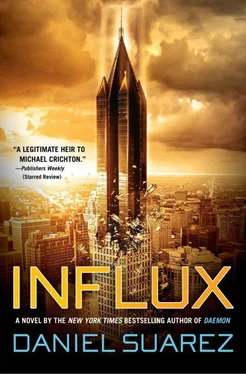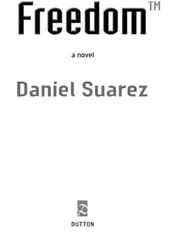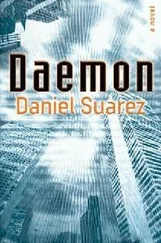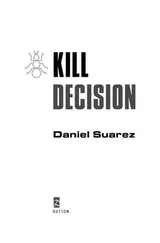So he passed his days thinking, and lately not just about escape.
Grady removed his scratchy coat and hung it up on a peg by the door. He passed by his writing desk, flipping through his papers. He had plenty of paper and pens but only one book. They had provided him with a slim leather-bound volume, its title etched on the spine in gold leaf: Omnia . The first time he flipped through the book’s vellum pages, they were entirely blank—except for one page on which the words “While I’m open, ask me anything” were written. He tried writing questions on the facing page but couldn’t mark the surface. In frustration he finally spoke aloud the first thing that came to mind.
“How do I get off this island?”
Suddenly the pages filled with text and images relating to his own gravity research, including a table of contents on the first page and an annotated bibliography in the back. He flipped through the newly filled pages, and noticed hyperlinks that when tapped refilled the book with more detailed information. In this way he zoomed in and out of his research papers, poring through the thousands of pages of lab notes, diagrams, spreadsheets, and test results from years of work—everything he and Bert had written. Even the handwritten Post-it notes had somehow been recorded and projected onto the vellum pages. Photos of the gravity mirror apparatus being constructed, the works he’d read on kinematics, Ricci curvatures—everything he’d ever absorbed on quantum mechanics. It was endless.
The book was clearly some form of advanced technology—for while the pages appeared to be quality vellum, they acted like high-definition digital displays. A private Internet. Yet no matter how hard he examined the material, he couldn’t see any flicker. The text seemed physical—like quality ink. Neither did the book have any apparent battery or power connector. It looked and felt like a very old encyclopedia. He opened it again to the title page and spoke the words, “What does Omnia mean?”
The current page went blank and was replaced by the word Everything.
Grady had nodded to himself, then said, “Teach me ocean navigation.”
The pages quickly filled with articles on sea navigation, but large sections appeared to be redacted with black bars and boxes—concealing the most necessary details.
Grady then demanded, “Show me small-boat building techniques.”
Again, the book filled with censored articles, the images and text blacked out, only their promising titles revealed—as if in spite.
Not an Internet then but a redacted virtual library. All of it tightly controlled. And as if to demonstrate how controlled it was—it returned results but didn’t let you see them. Only offering answers deemed harmless or helpful to its masters. But how was it able to determine what to censor almost instantaneously? Obviously some highly advanced technology.
But then, it had to have some wireless technology in it to transmit requests and receive data—a radio transmitter and receiver. Probably low power, but he might be able to rig something like a shortwave device. Make an antenna. Boost the signal. He spent the next several days trying to tear the book apart to cannibalize it, but it was made of sterner stuff than he expected. Even cutting or tearing the pages was beyond him with knives, fire, or brute force. The leather was just as durable. Smashing it, crushing it—nothing so much as scratched it. There must have been some major advances in materials science he was unaware of. Probably fashioned of carbon lattices or something similar. He had to admit that their technology was formidable.
At some point Grady closed the book and never picked it up again. It now sat on his shelf beneath a crystalline rock he’d found inland.
His experience with the disarmingly high-tech “ancient” book made him suspicious about the paper and pens, too. At first he was determined not to use them, reasoning that his captors would use advanced tech to monitor whatever he wrote down. But then he’d rediscovered an old pastime he hadn’t thought about in ages.
He started writing music again.
When he was young, he would sometimes ponder the tones he heard in math. After teaching himself to read music, he decided to try his hand at composing—although he had little interest in traditional music. Now he decided to cultivate one, and the BTC could monitor it if they liked. They would be his audience. He wished he had a piano or guitar, but he could always play the music in his head. It amused him to think of his BTC captors trying to derive the deeper meaning from this work. To the best of his knowledge there wasn’t one—just a pleasing, fractal symmetry.
Grady picked up a piece of parchment covered with musical notations and ran through several movements of an amateur symphony, waving one hand as if conducting. He laughed to himself. He was writing a goddamned symphony. It was a ridiculous thing, and he never would have done it in a million years if he weren’t a prisoner.
And it wasn’t going well. He wondered how Mozart, Beethoven, and those guys did it. He had some good movements, but unifying the whole was a mother—he wasn’t going for Copland’s Billy the Kid here. He was going for beauty, a mournful melancholy like that inside him. But he seemed to lack the vocabulary. He had to admit that for all his talents, music was not one of them. It did not come as easily to him as math—even though the two fields seemed in some way related.
Grady walked over to the kitchen to see what the gnomes had brought him. They always placed his food supplies on the kitchen table in wax paper bundles bound with twine. He sniffed them separately. Some white fish. A packet of salted pork. Vegetables. Sweet butter. Fresh loaves of bread—not soft French or Italian stuff but sturdy dark loaves that lasted several days. Milk. Water. Another jug of red table wine. He always resisted the temptation to finish off the wine in a binge, instead having a mug with dinner and no more. There were plenty of reasons to want to drown his sorrows, but he knew they were watching him; he didn’t want to give them the satisfaction of knowing how hopeless he felt. He’d searched for cameras and microphones for weeks after he’d arrived—dragging every stick of furniture out of the place. But if the BTC was using surveillance devices, they were too small or well concealed to detect.
It was the same every week. Fresh supplies came when he was out. If he tried to spy upon his benefactors, then the supplies did not come, and he went hungry. Several times he searched for hidden doors but always came up empty. So he’d decided to forget about it. It was the BTC. No mystery, but apparently they didn’t want him to have companionship. So he took his daily walk, and on Foodday (as he’d taken to calling it), the food arrived. There were seven days in Grady’s week, and he’d used them to create a calendar that he tacked to the wall: Foodday, Cookday, Exerciseday, Workday, Writingday, Watchingday, Escapeday. He kept the schedule as a way to stay sane. Structure was important to keep the human mind from getting lost.
Grady stared out the distorted, rustic window glass at the dark sea far below. A bank of fog was coming in from the north. It was the evening of Foodday. Schedule or no, his mind was indeed starting to get lost.
I might grow old and die here.
What had happened to Bert and the others? He wondered that several times a day. Had they taken up roles in the BTC? He couldn’t picture that. Then what happened to them? Were they on some island, too? And why place any of them on an island? Why, in fact, did they let them live at all? They clearly had all Grady’s gravity research. They didn’t need him. He was a liability. Why keep him around?
Читать дальше












